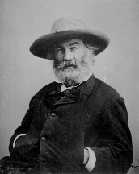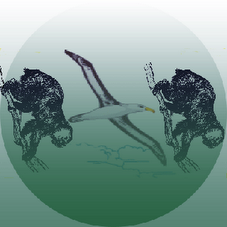 CAPITAINE ARISTIDE ABSINTHE KNEE-TREMBLAY
CAPITAINE ARISTIDE ABSINTHE KNEE-TREMBLAY
SOLDIER, EXPLORER, RACONTEUR, POET
Capitaine Aristide Absinthe Knee-Tremblay has died, at Tresoddit, his clifftop home in St Buryan, aged 116.
Knee-Tremblay was born in Bal-Trap, a tiny village to the south-west of Paris, on February 30th, 1838. In later years he always claimed to be the lovechild of Napoleon III, but local tradition insists that he was, in fact, the illegitimate son of the local priest and a particularly attractive but slatternly ewe named Genevieve.
As a young man, Knee-Tremblay acquired a reputation as a womaniser, duellist, and gambler. When challenged by the husbands and lovers of his conquests to "choose his weapon", he would invariably select the classical tarte à la crème, in the use of which he was an adept.
Knee-Tremblay published his first volume of verse, Premiers Oeuvres, at the tender age of thirty-eight. This juvenile work, though heavily influenced by Rimbaud and Baudelaire, was nonetheless warmly praised by Stéphane Mallarmé. In later years, Yeats described its influence on his own early work as "bollocks".
But it was in World War II that Knee-Tremblay came to the attention of the British. Following the fall of France, he rowed across the Channel in an open boat and joined De Gaulle's Free French forces in Accrington.
In 1944 Knee-Tremblay was seconded to the 1st Highland Foot and Mouth, in the capacity of French interpreter. It was his job to co-ordinate joint operations between the 1st Highland and the Maquis, after D Day. Unfortunately, Knee-Tremblay's grasp of Scots patois was not as great as his grasp of standard English, and he was apt to make mistakes. It was such a misunderstanding that led to the Maquis' courageous but ultimately doomed attack on the Tunnel of Love at the Lille funfair. Excusing the fiasco after the war, Knee-Tremblay was apt to say that, after all, it was only a sideshow.
After the war, Knee-Tremblay gave up soldiering to pursue his other great interest -- exploration. In five years he visited some of the most remote regions on earth, including the then largely unexplored Amazonian rainforest, central Mongolia, and West Penwith. In the latter region he is credited with being the first modern European to traverse the ancient coastal track from Lamorna to Porthgwarra. The public acclaim that greeted this achievement convinced the Frenchman that he should make his home in Cornwall.
In his later years Knee-Tremblay became a familiar figure in West Cornwall, where he was known affectionately as "that Froggie geezer".
Knee-Tremblay leaves a wife, Mathilde Clothilde, and a son, Absinthe Jnr.
OBITUARY
Posted by
Editor: Sylvanus Penhaul
0
comments. CLICK HERE TO ADD A COMMENT
![]()
Labels: bestiality, Lamorna, Obituaries, Poetry, St Buryan
Subscribe to:
Comments (Atom)




